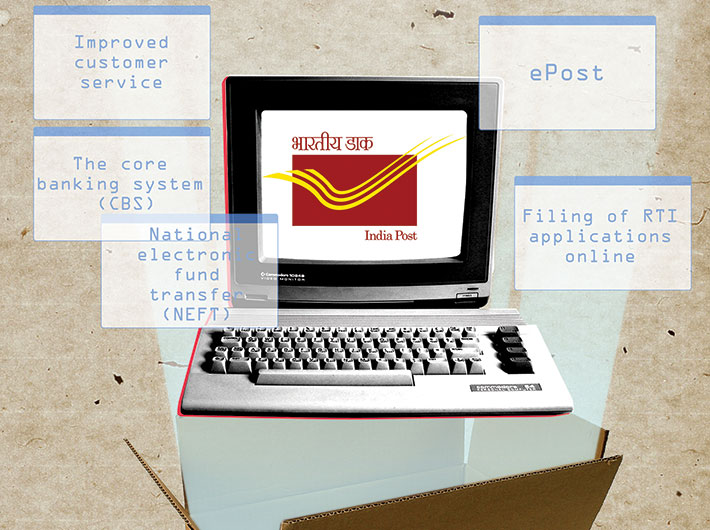To modernise services and bring it all to a single window, the department of posts has initiated an information technology project
The 150-year-old government-run India Post is the world’s largest postal network with over 1,55,000 post offices across the country. It is still widely in use, despite the increasing penetration of internet and mobile phones in the communication channel. India Post offers various other facilities like the small savings scheme, life insurance cover under the postal life insurance (PLI) and rural postal life insurance (RPLI). It also offers retail services like bill collection, sale of forms, apart from wage distribution and disbursement of old-age pensions.
To modernise services and bring it all to a single window, the department of posts (DoP) has initiated an information technology project. Though the project was approved by the Cabinet Committee of Economic Affairs (CCEA) in August 2010, it was formally launched only on September 28, 2012. “Funded under the five-year plan, the project was envisaged with a budget of '6,000 crore,” says a senior director in DoP. “The initial deadline was 2012, but was pushed to 2015 due to problems in vendor selection.”
The project aims to provide better customer service through business process optimisation and to grow new lines of business.
“The project is being implemented to create an IT backbone for the department. It will provide end-to-end computerisation on a central platform,” says the senior director. The modernisation will be done through eight mini projects of rural ICT - hardware, rural ICT system-integrator, data centre facility, core systems integrator, financial services system, mail operations hardware, network integrator and change management.
Financial inclusion
The project also aims to facilitate financial inclusion for those who have limited or no access to banks. The rural ICT project will provide retail postal services, providing rural branches to increase their revenue. On the execution side, the tender for acquiring hardware has already been floated in March 2014. As per the contract, the vendor will have 10 months to complete the project. In terms of hardware, the vendor will be required to supply computers and special handheld device to the rural branches in all the 300 locations. The handheld device will act as a mobile post office.
Once the vendors are selected for the implementation, it will be their responsibility to connect with the local service provider to get internet connectivity for these devices.
The handheld device will further act like a one-stop solution in implementing government welfare schemes. Instead of the beneficiary going to the post offices for the various services, everything will be done on the device. The device will be powered through solar panels that will be installed at the various branches. Built to customised specifications, these handheld devices have been designed to act in the offline mode as well.
“There has been a problem in procurement. We have been trying to implement this project for the last two years,” a senior official says. “There are only a few vendors who can produce these devices, as per the specifications mentioned by us, on such a large scale. However, we are hopeful that everything will be rolled out by the end of this year.”
Banking on the right way
The core banking system (CBS) mini project aims to bring multiple channels of banking service deliverables like the internet, mobile and ATM to one platform. The CBS will be developed by Infosys. It has been implemented on a pilot basis in eight circles in states like Uttar Pradesh, Tamil Nadu, Maharashtra, Assam, Rajasthan, Karnataka, Andhra Pradesh and Delhi. The key features include online update of transactions on the CBS platform, proper indexing, scanning and tagging of all account opening and KYC-related documents, new internal auditing system, transfer of funds to accounts through the national electronic fund transfer (NEFT)/electronic clearance services (ECS) and real-time gross settlement (RTGS). As of now the project has been implemented in 70 post offices across the country, along with five ATMs, including two in Delhi.
A source in the department said the pace of implementation has been slow, but is expected to pick up by August this year. “We hope to open 1,000 ATMs. Once that is done, the impact of the project will be felt,” says the senior director. The department is planning to open 2,800 ATMs across the country by 2015.
Public utility with web interface
The project is also integrating email as part of its mail services. One of the key features of the new mail operations is the ePost. In an attempt to bridge the digital divide, the department has introduced the concept of ePost. Citizens can send their messages in soft copy to the post office destination. Once the concerned post office receives the message, it delivers the message to the receiver in hard copy on the address mentioned by the sender. A nominal fee of '10 is charged per A4 sheet. This service has already been launched on a pilot basis. The mail service operations have been revamped, including the tracking of mails through a unique barcode, digitising proof of delivery of both mails and packages, payment through various modes like debit and credit cards and article weight automatically captured in the web portal through an integrated weighing machine. In addition, the e-commerce portal launched by the department has slowly gained popularity. With its new avatar, the department’s functions now include online booking of speed posts, online filing of RTI applications and an email system that is based on the address of the receiver.
360-degree integration
To support the DoP’s modernisation with adequate infrastructure and network integration, Sify has been finalised to implement the wide area network (WAN) that will connect all the post offices, especially those in the rural areas under the Network Integrator mini project. Once implemented, India Post’s WAN will be the biggest in the country, covering 28,000 locations. By March, 18,000 locations had already been covered. There will be two types of connections: BSNL for primary connection and Sify for connecting to the data centre in Mumbai. The Core System Integrator mini project has been awarded to Tata Consultancy Services (TCS). Speaking about the project, Tanmay Chakrabarty, vice president & head of the Global Government Industry Group, TCS, said that the Core System Integrator (CI) will act like a cementing agency in integrating all the other components of the modernisation project. “The core system integrator will be like the mother integrator of all the components and TCS will be implementing it for five years. We will implement the project in phases and in the next six months you will see a revamped India Post portal. It will offer a new set of services.”
Not only will the CI integrate all the aspects of the project, it will also automate all internal functions across the post offices, including accounting and human resources (HR) functions. Chakrabarty says, “From the dakiyas [postmen] to the Dak Bhawans, all the employees will be stitched into one IT platform. With this application, a uniform practice of work will be in place. The application will also deploy retail front-end capabilities.” It will be implemented in three phases. The first phase, which was to be implemented by April 1, 2014, covered all functions related to the data centre. The second phase, to be implemented in the next few months, will oversee all works related to the applications launched by the department. The last phase, to be implemented by the end of the year, will include the total revamping of the departmental portal. In order to facilitate the integration, a data centre was launched in Mumbai in February under Data Facility mini project. The data centre is currently managed by Reliance Communications. It will storage all the data related to the department. A second data recovery centre will be launched in Mysore by the in-house team of the department.
Managing change & branding
Officials of the department said one cannot expect an employee who has been in the department for 20 years to suddenly start using these modern tools. However, understanding the need for the softer cultural issues, DoP is working towards capacity-building of nearly 5,00,000 employees. The programmes are aimed at making the employees comfortable with the modernisation plan.
Collectively, they are part of the ‘change management’ plan. The training and capacity-building modules aim to prepare the staff in streamlining the new processes. With its long legacy and widespread reach, India Post is probably the best option to reach out to maximum citizens of the country. “The organisation has always been pictured as sleepy and manual. The IT modernisation project will add value to the whole organisation,” says the
senior director.



